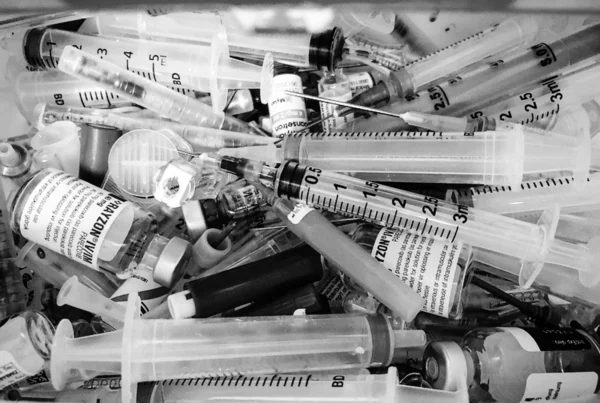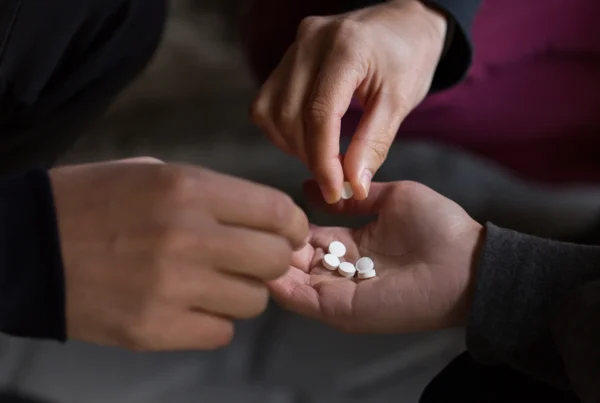
Table of Contents
- Is Prozac Addictive?
- How Long Does It Take To Develop a Physiological or Psychological Dependence on Prozac?
- Can You Take Prozac if You Have a History of Substance Abuse?
- How Does Prozac Affect The Brain Differently From Addictive Substances?
- Can Prozac Be Used Recreationally?
- What is Serotonin Syndrome?
- Can Prozac Be Used to Treat Addiction?
Key Points:
|
Is Prozac Addictive?
If your healthcare provider has prescribed you fluoxetine (brand name Prozac), they have determined that the benefits outweigh the risks of the medication. However, it is crucial to fully understand the medications that you take, especially if you have a history or predisposition to addiction.
While Prozac is often used to treat addiction symptoms to alcohol or drugs like heroin or methamphetamine, many individuals are curious whether or not Prozac itself is addictive.
Here’s what you need to know about Prozac and addiction.
Can You Get Addicted To Prozac?
Prozac is a medication known as a serotonin reuptake inhibitor (SSRI). SSRIs are not considered physically addictive like opioids or benzodiazepines. However, taking Prozac can result in physiological and psychological dependence and may produce withdrawal symptoms upon ceasing use.
Prozac and Physiological Addiction
Physiological dependence occurs when the brain adapts to a substance and requires regular doses for normal functioning. With SSRIs like Prozac, the brain begins to rely on the increased levels of serotonin produced by the medication.
Prozac and Psychological Addiction
While Prozac is not physically addictive, it is possible to develop a psychological addiction to the medication. Some individuals become reliant on Prozac to manage their emotions and eventually feel as if they will not be able to function without it.
Abruptly stopping Prozac or tapering too quickly can cause withdrawal symptoms, which can be both physical and psychological.
Are Physiological and Psychological Dependence on Prozac the Same as Addiction?
Physical dependence is not the same as addiction. A physical dependence occurs as a response to a physiological adaptation to the drug, while addiction involves compulsive drug-seeking behavior, cravings, and the inability to control drug use.
 How Long Does It Take To Develop a Physiological or Psychological Dependence on Prozac?
How Long Does It Take To Develop a Physiological or Psychological Dependence on Prozac?
Physiological dependence on Prozac can develop over time and with regular use. This is especially true for those who take higher doses of the medication. How long it takes to develop a Prozac dependency depends on genetics, dosage, duration of use, and individual mental and biological factors.
If an individual wishes to stop taking Prozac, is it crucial that this process be supervised by a healthcare provider as stopping SSRIs abruptly can lead to withdrawal symptoms, including suicidal thoughts or ideations.
What Are The Signs Of Prozac Dependence?
If an individual relies on Prozac to function in everyday life, there is a chance they have developed a dependence on the medication.
The signs of Prozac dependence may include:
- Difficulty reducing or stopping Prozac use
- Increased anxiety, irritability, and changes in mood when Prozac use is reduced or stopped
- Tolerance to Prozac, requiring an increased dosage to achieve the desired effect
- Withdrawal symptoms such as anxiety, irritability, and mood swings, or “zaps” when stopping use or reducing the Prozac dose
What are Prozac Withdrawal “Zaps?”
Those who have stopped taking Prozac or another SSRI like Zoloft often describe brief electric shock sensations in the brain and body [1]. This phenomenon is sometimes referred to as “zaps.” Zaps are typically not painful and are more often described as uncomfortable.
Zaps are a common side effect of SSRI withdrawal and can occur when the medication is reduced or stopped too quickly, or when an individual attempts to stop taking the medication without the guidance of their healthcare provider.
A tapering schedule can minimize the risk of SSRI zaps as well as other withdrawal symptoms.
Can You Take Prozac if You Have a History of Substance Abuse?
Prozac is not considered a drug of abuse. However, those with a history of substance abuse may be prone to misuse the drug, and are more susceptible to developing a dependence. However, Prozac is often used in drug addiction treatment.
How Does Prozac Affect The Brain Differently From Addictive Substances?
Prozac works by increasing the levels of a serotonin in the brain, which is responsible for mood regulation and other functions. Addictive substances, conversely, like opioids and benzodiazepines, work by binding to specific receptors in the brain and stimulating the release of another chemical called dopamine, which produces feelings of pleasure and euphoria.
While both types of substances can affect brain function, they do so in different manners. Prozac and other SSRIs do not produce the same immediate feelings of pleasure and reward as addictive substances, which may make it less likely to be misused or abused.
Do SSRIs Like Prozac Have Side Effects?
Like any medication, Prozac comes with a risk of side effects. Many SSRIs cause similar side effects, but every person’s body chemistry reacts differently to medications.
Below is a chart showing some of the most common, less common, and least common side effects of Prozac and other SSRIs.
| Medication | Most common side effects | Less common side effects | Rare side effects |
| Fluoxetine (Prozac) and other common SSRIs | Nausea, diarrhea, insomnia, headache, dizziness, decreased libido, weight changes | Anxiety, nervousness, sweating, tremors, dry mouth, increased urination | Seizures, suicidal thoughts, Serotonin Syndrome |
Can Prozac Be Used Recreationally?
SSRIs like Prozac are not considered recreational drugs and are not typically abused to achieve a “high.” However, taking Prozac without a prescription is considered drug abuse and can lead to severe consequences, some of which may even be life threatening, such as Serotonin Syndrome.
What is Serotonin Syndrome?
Serotonin is a neurotransmitter that helps regulate mood and sleep, as well as other functions. When there is an excess of serotonin in the brain, the individual may develop what is known as serotonin syndrome [2]. This condition is potentially life threatening.
Serotonin syndrome is most commonly associated with SSRIs such as fluoxetine (Prozac), sertraline (Zoloft), paroxetine (Paxil), fluvoxamine (Luvox), citalopram (Celexa), escitalopram (Lexapro). Serotonin syndrome can also be caused by other medications such as serotonin-norepinephrine reuptake inhibitors (SNRIs), and monoamine oxidase inhibitors (MAOIs).
Serotonin Syndrome may occur if an individual takes an excessively high dose of a medication that affects serotonin levels or when combining several serotonin-related medications.
Some of the signs and symptoms of serotonin syndrome include:
- Agitation, irritability, or restlessness
- Confusion
- Delirium
- High blood pressure and rapid heart rate
- Dilated pupils
- Muscle rigidity
- Muscle tremors
- Nausea, vomiting, or diarrhea
- Excessive sweating
In severe cases, hospitalization may be necessary. If untreated, Serotonin Syndrome may progress to seizures, respiratory failure, and loss of life.
If you or someone you know is experiencing any symptoms of Serotonin Syndrome, seek medical help immediately.
Can Prozac Be Used to Treat Addiction?
Prozac is not an addiction treatment medication specifically, but may be used in conjunction with other therapies in the treatment of substance use disorder (SUD), especially for individuals who have a co-occurring anxiety disorder or depression.
Studies have shown a correlation between anxiety disorders [3] or depression with the development of addiction. Treating the underlying causes of addiction with medications like Prozac may help in reducing the risk of relapse and improving overall mental health.
Other studies have shown that Prozac may be helpful in reducing cravings for substances [4] such as alcohol or cocaine.
Although the root cause of addiction in some individuals may be anxiety or depression, Prozac is not meant to be a standalone treatment and should always be used in conjunction with other therapies such as individual and group counseling.
If you or someone you know is struggling with drug use and is curious about the role of Prozac in addiction treatment or need help reducing physiological and psychological dependence, it is important that you seek help from a medical professional.
Drug Addiction and Dependence Treatment at Ocean Recovery
Whether you would like to reduce your dependence on SSRIs or you are curious how an SSRI like Prozac can help you overcome addiction, we’re here to answer your questions.
Call and speak to a member of the Ocean Recovery team today and learn more about our life changing addiction treatments.
Sources:
[1] Papp, A MD, Onton, J. PhD. NCBI. (2018, Dec 20). Brain Zaps: An Underappreciated Symptom of Antidepressant Discontinuation. Retrieved from https://pubmed.ncbi.nlm.nih.gov/30605268/ on 2023, March 27.[2] Patel D. BS, Galarneau D. MD. NCBI. (2016). Serotonin Syndrome With Fluoxetine: Two Case Reports. Retrieved from https://www.ncbi.nlm.nih.gov/pmc/articles/PMC5158166/ on 2023, March 27.
[3] Smith, J. PHD., Book, S. MD. NCBI. (2008, October 25). Anxiety and Substance Use Disorders: A Review. Retrieved from https://www.ncbi.nlm.nih.gov/pmc/articles/PMC2904966/ on 2023, March 27.
[4] Douaihy, A., Kelly, T., & Sullivan, C. NCBI (2013). Medications for Substance Use Disorders. Retrieved from https://www.ncbi.nlm.nih.gov/pmc/articles/PMC3767185/ on 2023, March 27.

 How Long Does It Take To Develop a Physiological or Psychological Dependence on Prozac?
How Long Does It Take To Develop a Physiological or Psychological Dependence on Prozac?


